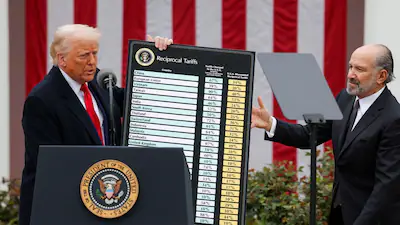U.S. Trade Court rules global tariffs imposed by Donald Trump as unlawful, halting their enforcement amid legal challenges and international backlash.

A large portion of former President Donald Trump’s global tariffs has been ruled illegal and overturned by the U.S. trade court, delivering a significant setback to a key part of his economic policy.
A three-judge panel from the U.S. Court of International Trade in Manhattan ruled on Wednesday in favor of Democratic-led states and a coalition of small businesses, determining that former President Trump improperly used an emergency law to support certain tariffs he imposed.
The Trump administration submitted a notice of appeal challenging the ruling, potentially setting the stage for the U.S. Supreme Court to make a final decision in this high-stakes case—one that could influence trillions of dollars in global trade.
The ruling marks one of the most significant legal defeats for Trump as he faces a surge of lawsuits challenging his executive orders and attempts to expand presidential authority. Other legal challenges target his mass dismissal of federal employees, proposed limitations on birthright citizenship, and attempts to cut federal spending already authorized by Congress.
“Global markets have experienced sharp fluctuations since Trump issued a sweeping executive order on April 2 imposing new tariffs. In the weeks that followed, trillions of dollars in market value were lost and regained amid a series of delays, policy reversals, and shifting announcements about potential trade agreements—especially involving China.
The order suspends most of Trump’s tariffs, including his broad flat tariff, increased duties on China and other countries, and the fentanyl-related tariffs targeting China, Canada, and Mexico. However, tariffs imposed under separate authorities—such as Section 232 and Section 301—remain in effect. These include tariffs on steel, aluminum, and automobiles.
“Foreign countries’ unfair and nonreciprocal trade practices toward the United States have driven our long-standing trade deficits,” Kush Desai said in a statement. “These deficits have caused a national crisis, devastating American communities, displacing workers, and undermining our defense industrial base — none of which the court contested.
Trump used the International Emergency Economic Powers Act (IEEPA) in his executive order to justify broad global tariffs. This law gives the president authority to regulate financial transactions during national emergencies, often in the context of imposing sanctions.
Table of Contents
Trump stated that he was authorized to use emergency powers to impose tariffs because the country’s “large and persistent” annual trade deficits worldwide represented “an unusual and extraordinary threat” to both national security and the economy.
The panel of judges ruled that Trump’s first executive order imposing global tariffs, along with the subsequent order adding tariffs on countries that retaliated, both went beyond the president’s authority under the emergency law. Additionally, a third executive order targeting Mexico and Canada with tariffs over drug trafficking concerns was found illegal by the court, as those tariffs did not effectively address the trafficking issue.
conservative legal advocacy group filed a complaint on behalf of small businesses, accusing Trump of abusing the law by imposing tariffs under a false claim of emergency. The Liberty Justice Center argued that the U.S. trade deficits do not constitute “an emergency or an unusual or extraordinary threat.” Furthermore, the group contended that even if such an emergency existed, the law does not permit the president to impose broad, across-the-board tariffs.
Democrat-led states argue that the tariffs effectively act as a huge tax on American consumers and violate Congress’s authority. They also contested Trump’s tariffs on Mexico and Canada, which rely on the same emergency law justified by concerns over cartel activity and drug trafficking.
The US Trade Court is a federal court established by Congress to resolve specialized trade-related disputes, such as those involving tariffs. Appeals from its decisions follow the same path as those from district courts, meaning that any challenge by Trump would proceed to a federal appeals court and potentially reach the US Supreme Court. Like other federal judges, the Trade Court judges are appointed by the current president.
READ ALSO…….Golden Dome Defense: Trump Offers Canada Free Access—If It Becomes 51st U.S. State














 Categories
Categories








